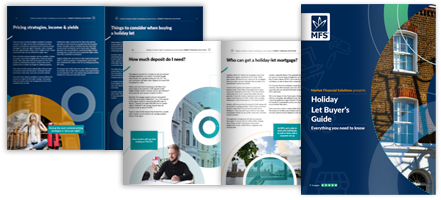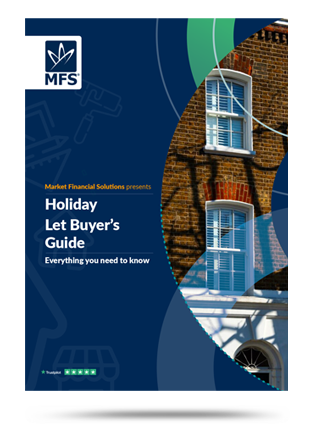
Written by Omkar Hushing
Deputy Chief Mortgage & Operations Officer – Front End
Market Financial Solutions are a bridging loan and buy-to-let mortgage provider and are not legal, financial, investment or tax advisers. This document is for informational purposes only and does not, and should not be considered, to constitute legal, financial, investment or tax advice or be relied upon by any person to make a legal, financial, investment or tax decision. Therefore, Investors are encouraged to seek appropriate professional advice. The information in this content is correct at time of writing.

The pandemic led to the emergence of staycations and holiday lets, with demand for holidays on British soil proving popular even after the worst of the covid years were behind us. The advent of a burgeoning staycation industry can be best illustrated via the emergence of Airbnb.
Airbnb completely upended the holiday-let market, for both property investors and consumers alike. The relatively young company has grown rapidly in recent years[1], creating opportunities for landlords and investors looking for new avenues of expansion.
As the world shut down, property investors snapped up holiday homes across the nation’s tourist hotspots. The number of Airbnb listings in England, Wales, and Scotland has risen exponentially[2].
With plenty going for it, the holiday let market, coupled with Airbnb’s business model, holds a lot of potential for property investors and expanding landlords. To keep investors on the right track however, this blog will break down the key elements they need to know for investing in staycation properties.
What are the legal requirements for holiday lets?
Landlords investing in this market will need to adhere to specific holiday let regulations. At a minimum, holiday let owners need to ensure their property is safe for their guests[3]. This covers a broad range of areas but generally, under the legal requirements for holiday lets, they must be safe from fire damage, electrical issues, gas problems, carbon monoxide poisoning, and more.
Also, depending on the location, a specific short-term rental licence may be required from the local authority[4]. This may be more prevalent in certain staycation hotspots, such as Cornwall or Devon. Holiday let owners must also ensure they make “reasonable adjustments” to accommodate disabled visitors who stay at their properties[5].
Legal requirements for holiday lets must be followed, but there are also certain features which aren’t required, but are still advisable to have. For instance, holiday let regulations do not require owners to have insurance. But having the right insurance can protect investors from accidental damage, theft, loss of rent, and more[6].
What’s more, an access statement – a document breaking down all the facilities and services a holiday home offers – is not technically required[7]. But guests would likely appreciate one, nonetheless.
If investors plan to invest in holiday lets via Airbnb, they’ll also need to follow the company’s rules, on top of public holiday let regulations.
Getting started with Airbnb
To start with, Airbnb users – both travellers and “hosts” – need to be aged 18 or over[8]. According to Airbnb, the hosting process will follow a 5-step process[9]: investors need to assess if their space is a good fit for their target market, get it ready for guests, list their asset on Airbnb’s platform, decide on how they’ll host (maximum number of guests, minimum number of nights etc), and set their specific pricing strategy.
Types of properties
When it comes to the types of properties they’ll be able to list on Airbnb, there are a wide range of options available. Investors can utilise everything from single rooms all the way through to private islands[10].
Airbnb itself separates these options into four types of “places”: entire place, private rooms, hotel rooms, and shared rooms. Outside of Airbnb’s parameters though, investors need to be aware of wider public rules they may need to follow.
Do I need a license and the council’s approval for an Airbnb?
As mentioned, legal requirements for holiday lets may force Airbnb investors to obtain approval, special permits, or business licenses from the local authority they’re operating in[11]. These requirements will likely vary between councils, with some having more stringent rules than others.
In London[12], for example, residential property may only be used for short-term lets if two specific conditions are met. These conditions are: the total number of nights that a property is used for short term letting must not add up to more than 90 nights in a calendar year, and at least one of the persons providing the accommodation must be liable to pay council tax at the property where the accommodation is provided.
What’s more, proposals are on the way that’ll require people who let out their properties as short-term holiday lets to seek permission from their local authority under a new “use” category[13].
Legislative changes take time and must be ironed out, but it’s still worth keeping an eye on the news so one is not taken by surprise.

What about the finances?
Once investors get all their ducks in a row, they can start focusing on the financial side of things.
How much can be earnt from an Airbnb/holiday let in UK?
Fortunately, Airbnb’s can provide a solid income source. While returns will vary, on average, hosts earn nearly £5,500[14] a year from their listings.
Of course, if hosts invest tactically, they may be able to generate particularly healthy yields. For example: between October 2021 and September 2022, Conwy had the highest median annual host earnings in Wales, totalling over £7,600[15].
For the holiday let market more broadly, the average monthly income sits at roughly £3,325 per month, based on an average monthly occupancy rate of 58. In comparison, that’s nearly 300% more than the rental income available via the traditional PRS[16].
Airbnb’s commission
Of course, investors will want to weigh up any potential returns against their costs. Most Airbnb hosts pay a flat service fee of 3%[17] of the booking subtotal. The subtotal will be the nightly price, plus any optional fees charged to guests – such as a cleaning fee.
Say a host charges £100 a night for a 3-night stay, along with a £60 cleaning fee. The subtotal would be £360. A 3% service fee on this booking subtotal would equate to £10.80. So, on the £360 booking, owners would earn £349.20.
Tax matters
Investors also need to factor in taxes. This is a complicated area however, and so guidance should be sought by accountants and other financial experts.
Every property investor’s tax bill will be dependent on their personal circumstances. But, holiday let owners should expect to pay 20 to 45% of their profits to HMRC[18].
Tax burdens also tend to rise,[19] and HMRC has intensified its crackdown on tax evasion by landlords of short-term properties – the kinds booked through platforms such a booking.com, VRBO, and Airbnb[20].
Following the legal requirements for holiday lets means adhering to all the applicable tax rules. But, as the rules can change at a moment’s notice[21], it’s worth working with experts in the field before taking any first steps.
Airbnb rules
If investors decide to move ahead with an Airbnb investment, they’ll likely want to make sure they’re on top of the requirements. While Airbnb will likely provide clear guidance, it expects hosts to follow its rules in these broad areas: reservation commitment, timely communication, listing accuracy, and listing cleanliness[22].
Long term rentals & tenant rights
There are also long-term considerations investors should take into account. While Airbnb stays are typically thought of as short-term options, it is possible to book long-term commitments through the platform.
Hosts need to be careful with these kinds of bookings. A recent ruling found long-term Airbnb lets are the same as traditional assured shorthold tenancies (AST[23]). This means investors, without realising, may need to adhere to strict safety, rental, and eviction rules[24].
EPC ratings
Investors may also need to keep their property (or properties) on the right side of EPC rules. It’s crucial they get on top of this. Nearly 5 million rental rooms across the UK are in properties with an EPC rating of D or below. This puts these rooms at risk of being unlettable[25].
How can one prepare for the future?
There’s a lot going on in the holiday-let scene. New legal requirements for holiday lets loom, which may push up costs for property investors – both monetary and administrative. But demand is still there.
The cost-of-living crisis made people think twice about jet-setting. Also, the UK tourism [26]and recreation [27]sectors are seeing rising demand and growth in the economy.
Incorporating an Airbnb asset or other holiday let investment into a portfolio could provide a solid income stream. Fortunately, we have a range of specialist finance products available that can assist with this.
Financing an Airbnb
Our buy-to-let mortgages bring bridging like speed and flexibility to landlords looking to expand. Our bridging loans can also allow investors to jump on any opportunities or requirements that may emerge in the market.
Then there’s our Permitted & Light Development loans, which can help upgrade homes to meet EPC minimums, while auction finance will allow borrowers to secure any bargains found at auction.
Regardless of how investors may want to move into this market, our underwriters will be there for them from day one. We’ll do our best to match property investors with a solution that allows them to take advantage of a staycation boom.
The Complete Guide to
Holiday Lets
Everything you need to know
- What to consider
- Costs, pricing, income
- Rules & regulations
- Finance options
[1] https://www.statista.com/statistics/1193134/airbnb-revenue-worldwide/
[2] https://www.thetimes.co.uk/article/the-uks-airbnb-hotspots-and-what-its-like-to-live-in-them-273hrjjmj
[3] https://www.sykescottages.co.uk/letyourcottage/advice/article/holiday-let-rules-regulations#Requirements%20for%20Letting%20a%20Holiday%20Property%20so%20that%20it%20Qualifies%20as%20a%20Furnished%20Holiday%20Let
[4] https://www.lakelandretreats.com/what-are-the-legal-requirements-for-holiday-lets/#health
[5] https://www.holidaycottages.co.uk/owner-advice/holiday-home-legislation#:~:text=Comply%20with%20the%20Equality%20Act%202010,-The%20Equality%20Act&text=There%20is%20not%20any%20specific,to%20stay%20in%20their%20property.
[6] https://www.lakelovers.co.uk/blog/uk-holiday-let-rules-regulations/
[7] https://www.holidaycottages.co.uk/owner-advice/holiday-home-legislation#:~:text=Comply%20with%20the%20Equality%20Act%202010,-The%20Equality%20Act&text=There%20is%20not%20any%20specific,to%20stay%20in%20their%20property.
[8] https://www.airbnb.co.uk/help/article/2876#:~:text=We%20all%20love%20to%20wander,account%20to%20travel%20or%20host.
[9] https://www.airbnb.co.uk/resources/hosting-homes/a/how-to-become-a-host-on-airbnb-490
[10] https://www.airbnb.co.uk/help/article/5#:~:text=Hosts%20on%20Airbnb%20offer%20a,hotel%20rooms%2C%20and%20shared%20rooms.
[11] https://www.airbnb.co.uk/help/article/961
[12] https://www.london.gov.uk/programmes-strategies/housing-and-land/improving-private-rented-sector/short-term-and-holiday-lets-london
[13] https://propertyindustryeye.com/michael-gove-announces-significant-changes-to-short-let-rules/
[14] https://news.airbnb.com/en-uk/airbnb-travel-helps-2-in-3-uk-hosts-afford-rising-living-costs/#:~:text=By%20staying%20in%20a%20listing,sharing%20their%20space%20on%20Airbnb.&text=That’s%20equivalent%20to%20almost%20two,for%20the%20median%20UK%20household.
[15] https://www.walesonline.co.uk/whats-on/travel/airbnb-hosting-how-much-earned-26261459
[16] https://www.propertyinvestortoday.co.uk/breaking-news/2024/1/new-analysis-shows-huge-returns-on-properties-used-as-short-lets
[17] https://www.airbnb.co.uk/resources/hosting-homes/a/how-much-does-airbnb-charge-hosts-288
[18] https://www.sykescottages.co.uk/letyourcottage/advice/article/furnished-holiday-let-tax-guide#:~:text=Tax%20is%20one%20of%20the,paid%20in%20taxes%20to%20HMRC!
[19] https://www.telegraph.co.uk/money/property/second-homes/second-home-tax-increase-conservative-gove/#:~:text=From%202025%2C%20new%20powers%20to,a%20sole%20or%20main%20residence’.
[20] https://www.mercianaccountants.co.uk/hmrc-targeting-airbnb-landlords/
[21] https://www.financialreporter.co.uk/budget-2024-government-scraps-property-tax-reliefs-and-reduces-higher-rate-property-cgt.html#:~:text=Holiday%20let%20landlords%20can%20claim,be%20abolished%20from%20April%202025.
[22] https://www.airbnb.co.uk/help/article/2895
[23] https://www.landlordzone.co.uk/news/warning-long-term-airbnb-lets-are-same-as-traditional-asts-rules-judge
[24] https://england.shelter.org.uk/housing_advice/private_renting/assured_shorthold_tenancies_with_private_landlords
[25] https://www.mortgagesolutions.co.uk/news/2023/04/17/almost-five-million-rental-rooms-could-fall-foul-of-epc-legislation/
[26] https://www.thisismoney.co.uk/money/markets/article-12991937/Half-UK-business-sectors-enjoy-demand-boost.html
[27] https://www.ttgmedia.com/news/tourism-sector-one-of-the-uks-strongest-performing-industries-39702





